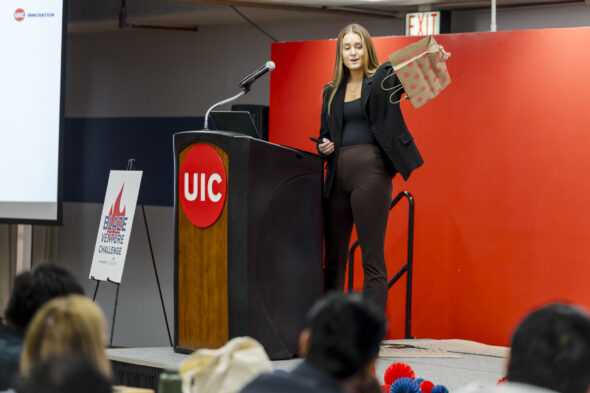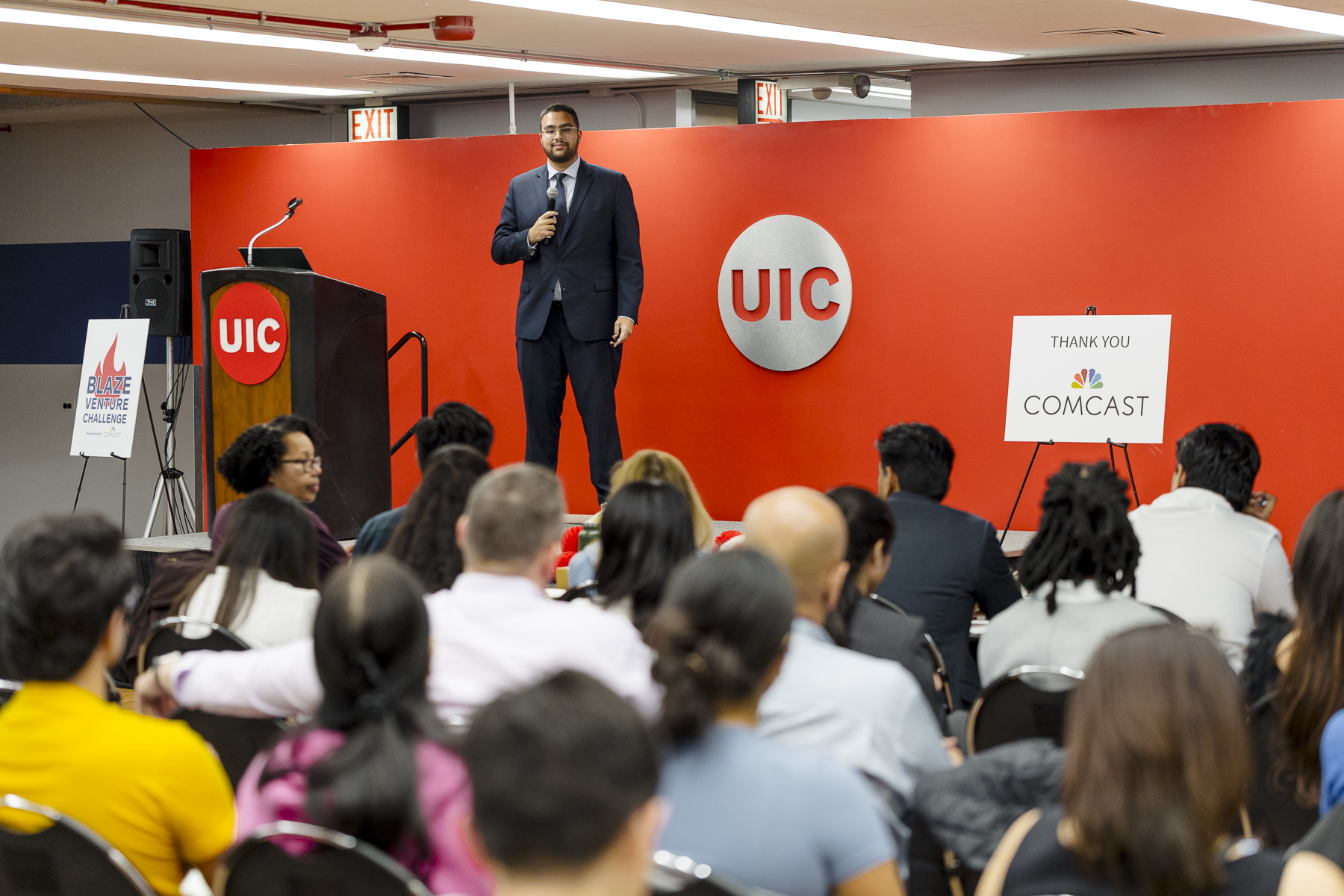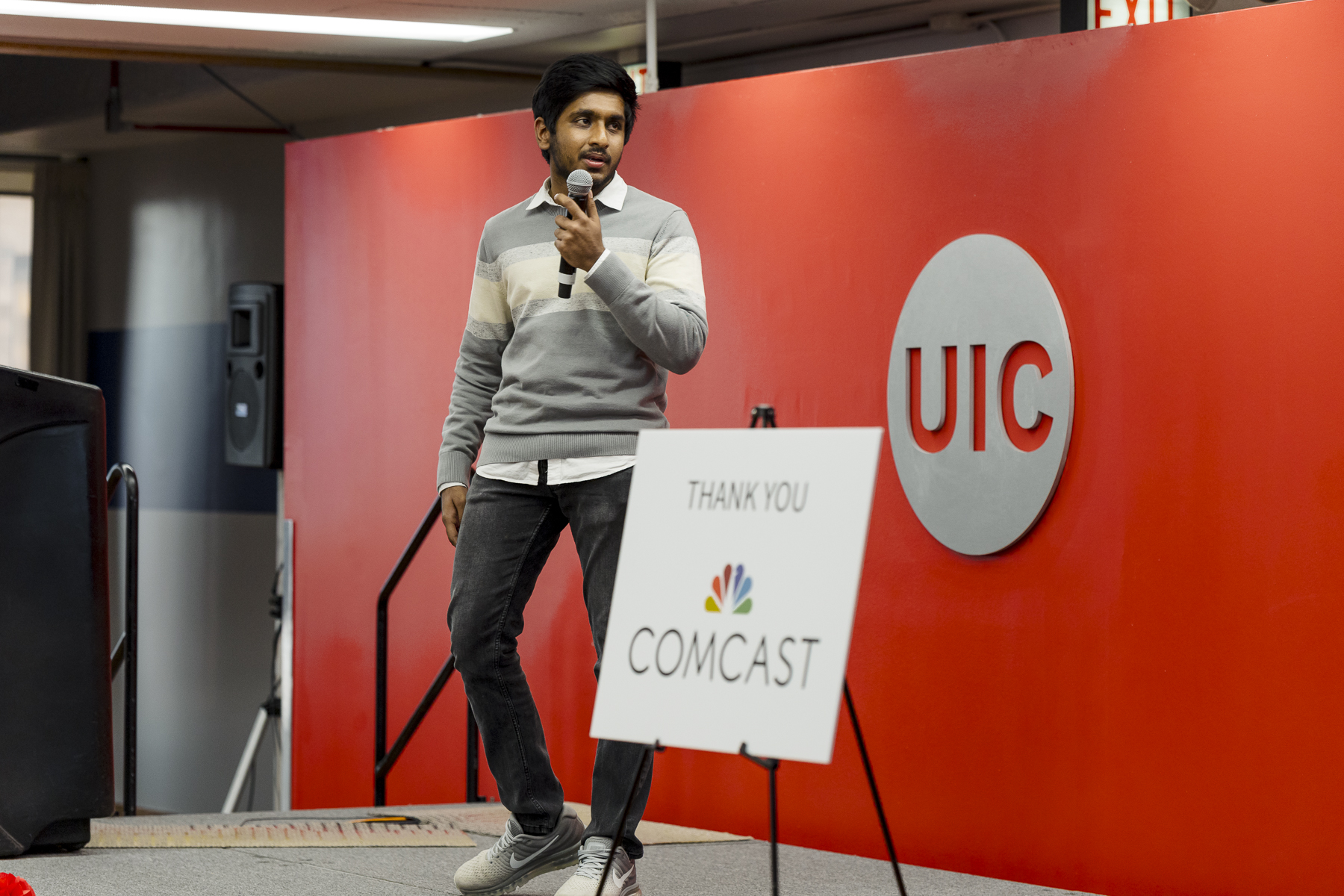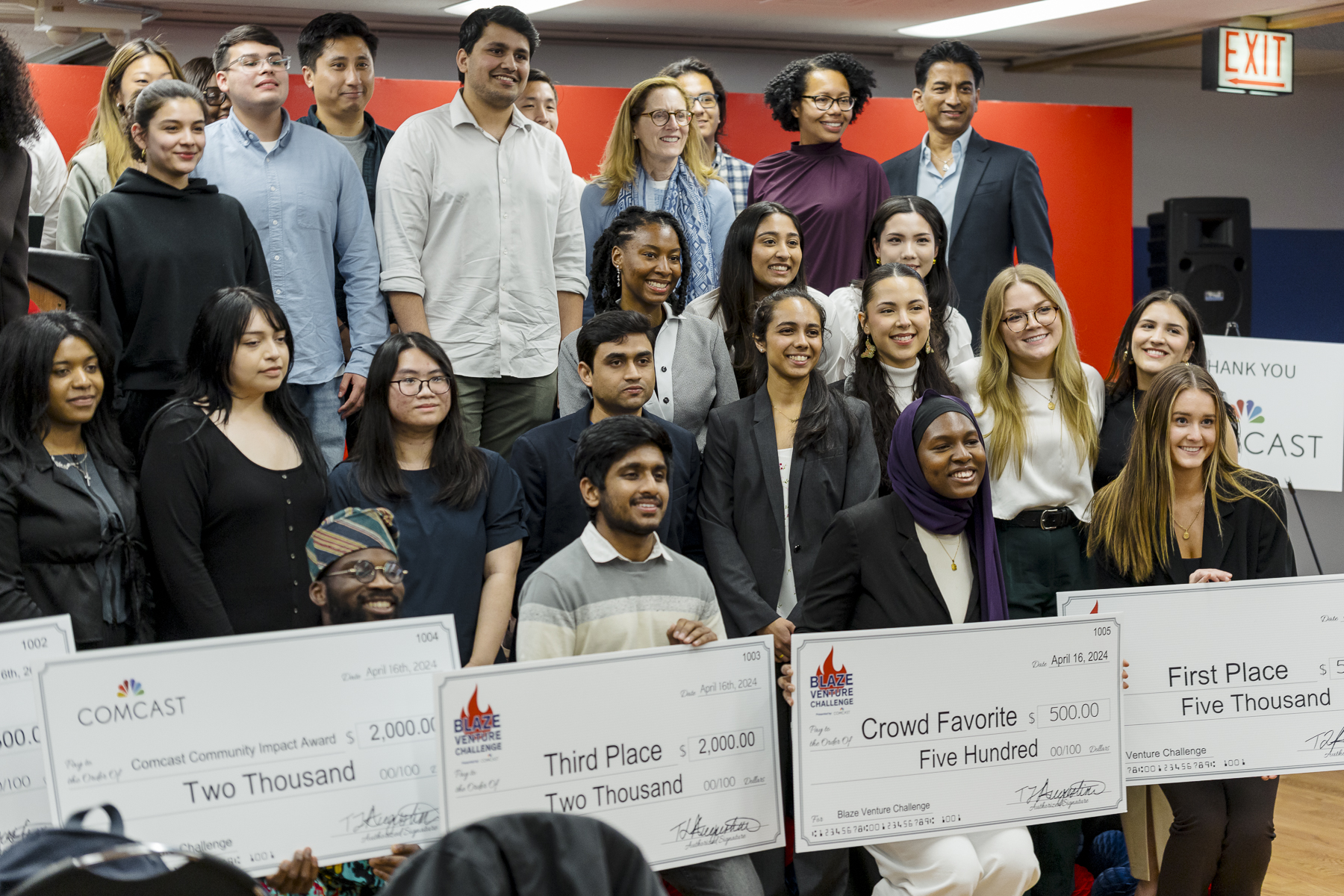UIC students compete in second annual Blaze Venture Challenge

With only five minutes to explain her million-dollar idea, UIC freshman Karolina Tomasik knew she had to make her pitch memorable to the Blaze Venture Challenge judges.
Standing at a podium in the Student Center East ballroom on April 16, the business major casually overturned a paper bag and sent dozens of plastic gift cards scattering over the stage. That, she told them, is what happens to many of the $1 billion worth of gift cards purchased in the United States yearly.
“Even though gift cards are small and slick, sometimes it is difficult to store all of them on you at all times,” Tomasik said. “And not only that, they tend to be misplaced, and their full-face value is not always redeemed.”
Tomasik’s idea, Creditz, landed her in first place, with a $5,000 prize. Creditz is a phone app that stores gift cards and allows users to send cards as gifts to others. It can even earn money by allowing the user to trade in unused portions of cards for points that can be used for other cards or be donated to charity, she said.
Tomasik’s pitch was one of eight the team of five judges — including UIC graduates and business leaders — were charged with evaluating as part of the second annual Blaze Venture Challenge. The “Shark Tank”-style competition kicked off UIC research week and was hosted by the Office of the Vice Chancellor for Innovation. The competition is designed to foster entrepreneurship and was sponsored by Comcast, which gave $13,000 in prize money.
Before being named a winner, Tomasik spent five minutes answering questions about her idea. The other would-be entrepreneurs, made up of UIC graduate and undergraduate students, each had a turn in the hot seat before the judges.
Nancy Harvey, a judge for the event and senior director of the venture capital company Illinois Ventures, said she could relate to Tomasik’s problem of unused gift cards, noting many were in a drawer in her home. Harvey asked the 19-year-old what it would take to make the idea a reality.
Tomasik said her next step would be to work with an app developer and focus on security.
Other winners included Ayaan Siddiqui, a sophomore bioengineering major whose idea, My Property, earned him the $3,500 second-place prize. Siddiqui’s idea was to develop a secondary market to trade real estate securities for commercial real estate property.
Siddiqui explained that anyone who wanted to invest in the property but who didn’t have a lot of money would be able to sell shares of the property on the My Property platform. The platform would ensure the property was valued correctly and that everyone involved was accredited. They would make money by receiving a share of the property that would be paid to My Property as a dividend, he explained to the judges.
“Investors buy shares, and those shares are traded on the secondary market,” said Siddiqui, who added that he has been interested in the real estate market since he was young.



Arun Yalamati, earning his master’s in computer science, pitched the idea for the Restaurant GPS app, which would help groups decide where to get together for a meal. He won $2,000 for placing third.
“People spend more than seven hours a week just making decisions, and one of the top decisions still happens to be when and where to have dinner,” said Yalamati. “Restaurant GPS acts as a web application that also acts as your personal assistant.”
The app would have a four-step process that begins with creating a virtual room for group members; the second step would either supply a game to help each member list their preferences or a form to fill out in 30 seconds. The third step would provide a spot that most closely meets the consensus and could make a reservation. The final step would provide a map, pictures of the restaurant, menu, hours of operation and even parking availability.
“For each and every group that we assist in reserving a table at the restaurant, we secure a modest fee that we charge the restaurant for the reservation or service we are providing,” Yalamati said. Advertising on the app would produce an additional revenue stream, he added.
In addition to the first-, second- and third-place winners, Daniel Kumapayi, a graduate student in the College of Urban Planning and Public Affairs, won a $2,000 Comcast community impact award for his idea, Àkójọpọ̀, a service to license African music and make it more widely available to the public. And Rasheedah Na’Allah, a sophomore majoring in sociology, won a $500 crowd favorite one-minute pitch award for her idea, AssistHer, an app that links women for wellness.
TJ Augustine, vice chancellor for innovation, said the competition is the signature event for student entrepreneurial programs through the UIC Office of Innovation. It’s one way UIC invests in “students’ entrepreneurial journeys,” he said.
Leading up to the Blaze Venture Challenge, students participated in workshops to generate ideas, research customers’ needs, network and get one-on-one mentoring. The eight teams were pared down from 27 original teams.
Tomasik said she was surprised when she was named the top winner because she was nervous in front of the judges.
“I was a little shocked; it’s all so exciting,” Tomasik said. “The next thing is to find somebody who knows how to code, who can design the app and hopefully launch on a small scale and go from there.”
Her parents, Justyna and Pawel Tomasik, were in the audience. They said they were happy their daughter, an Evans Scholarship recipient, could attend UIC.
“We’re so proud of our daughter; we know she is very smart and puts a lot of time to learn new things, and we are very, very proud and excited today,” said her mother, Justyna. “I think she got a lot of help from here.”
Comcast supported the Blaze Venture Challenge to invest in digital equity and community impact. Kristin Roadman and Elaine Harvey from the Office of the Vice Chancellor for Innovation helped with the program as part of efforts to support innovation and entrepreneurship at UIC.
